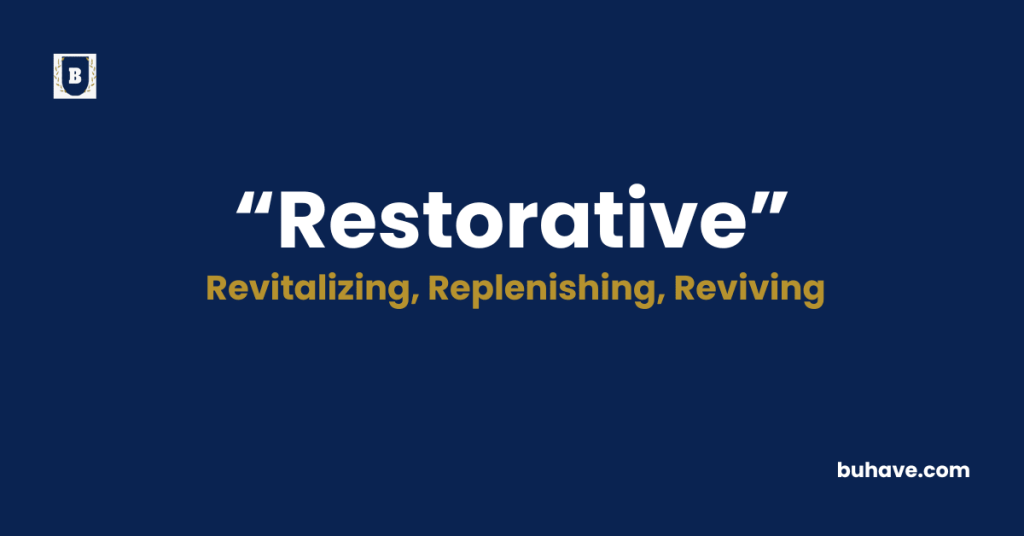The word ‘Restorative’ (Adjective) refers to something that has the power to restore health, strength, or well-being. In this guide, you’ll learn the full definition, synonyms, antonyms, etymology, and real-life examples of how to use ‘Restorative’ correctly in sentences.
Restorative Explained in Depth
A complete and detailed guide to the word Restorative including meaning, definition, examples, etymology, synonyms, and antonyms.
Meanings of Restorative
Restorative refers to anything that helps bring back health, energy, or a positive state of mind. Whether it’s physical recovery (like from an illness) or emotional renewal a restorative thing has healing qualities. You’ll often hear this word used for treatments, sleep, environments, or experiences that recharge or rejuvenate you.
For example, a quiet walk in nature can feel restorative because it calms your mind. A good night’s sleep is also restorative, as it helps you regain strength and clarity.
Definition:
Restorative having the ability to restore health, well-being, strength, or balance. It is used to describe anything that replenishes what has been worn down whether that’s physically, emotionally, mentally, or spiritually.
As a noun, it can refer to a treatment or substance (like a tonic) that restores health or vitality. As an adjective, it describes the healing or renewing effect something has.
Etymology
- The word “restorative” comes from the verb restore, which originates from Latin restaurare, meaning “to rebuild, renew, or repair.”
- “Restore” entered English in the 14th century, and “restorative” developed shortly after to describe the quality of something that could bring recovery or healing.
So, the word has always carried the sense of bringing something back to its original, healthy, or strong state.
Example Sentences:
- After a stressful week, the spa retreat felt incredibly restorative to both mind and body.
- Yoga is not only physical exercise—it also has a deeply restorative effect on mental clarity and calm.
- The herbal tea acted as a natural restorative, easing her nerves and soothing her digestion.
Restorative Synonyms:
- Healing
- Rejuvenating
- Reviving
- Therapeutic
- Regenerative
- Refreshing
- Invigorating
- Nourishing
- Comforting
- Strengthening
Antonyms:
- Draining
- Exhausting
- Debilitating
- Damaging
- Harmful
- Depleting
- Stressful
- Wearing
- Unhealthy
- Disruptive
FAQs about Restorative
Here are some frequently asked questions (FAQs) about the word “Restorative”
1. Can “restorative” describe emotional or mental healing?
Yes! The term is often used beyond physical health. A restorative activity might help calm anxiety, relieve stress, or improve mood and emotional resilience.
2. Is “restorative” used in medical or wellness contexts?
Frequently. It’s commonly seen in wellness, therapy, nutrition, fitness, and even dental or physical rehabilitation fields. A restorative approach focuses on healing and recovery rather than just treatment.
3. How is “restorative” different from “rejuvenating”?
- Restorative emphasizes bringing something back to its original or healthy state.
- Rejuvenating implies making something feel young, fresh, or lively again—even beyond its former state.
4. Can it be used as a noun?
Yes. As a noun, “restorative” refers to a remedy or substance that restores health or strength. Example: “The soup was a warm and comforting restorative.”
5. Is it a positive word?
Absolutely. “Restorative” has a very positive tone and suggests renewal, healing, and well-being. It’s commonly used to describe experiences or practices that are good for your body and soul.

















